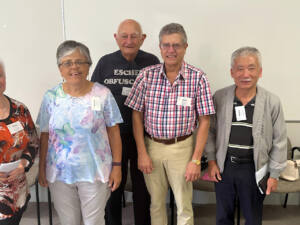
WelCom June/July 2024
Some 30 Catholic hospital chaplains from throughout the motu, some full-time but most part-time, gathered at the St Francis Retreat Centre in Hillsborough, Auckland for their first-ever national hui earlier this year.
Catholic chaplains work in hospitals throughout Aotearoa New Zealand, spending time with people who are unwell, as well as families and staff. Chaplains need to be resilient and always ready to support others. But they also need support and encouragement themselves, which is why this inaugural conference was held.
‘Typically, chaplains have a low profile until you meet them, either as a patient or when accompanying a loved one who is being diagnosed and treated in the hospital,’ says Senior Catholic Hospital Chaplain, Tony Lenton.
‘We are present in all major public hospitals. We spend time with those who are unwell, their families and staff. Chaplaincy teams are typically available 24 hours a day, seven days a week.
‘As part of the Church’s witness to the whole community, chaplains minister to anyone who needs them, without judgement or reserve. Chaplains support families in their concern and grief for their loved ones, and from time to time offer moral support to hard-working hospital staff. On occasion we are a surrogate family for the socially isolated and alone.’
The Catholic bishops are part of the Interchurch Council for Hospital Chaplaincy (ICHC), which is contracted by Te Whatu Ora-Health New Zealand to provide chaplaincy services in public hospitals.
Chaplains must be able to cope with a wide range of encounters with patients, says Tony.
‘These encounters range from gentle conversation through to ministry and ritual to those who are dying, and careful supportive presence to those in mental distress. We meet many patients who had no idea the symptoms which brought them to hospital that day would lead to a life-changing or, in some cases, life-limiting, prognosis. We support those impacted by an accidental death, suicide and those mentally unwell.
‘Chaplains need to be people of resilience and faith,’ says Tony. ‘They must be humble but honest in their self-belief. They must be knowledgeable about matters of faith and skilled conversationalists who are good listeners.’
The hui, held in February, featured a number of inspiring speakers. They included Fr Mark Chamberlain, who spoke on spiritual awareness, and ICHC Regional Manager Rev Joe Gray who celebrated the collaboration of Catholic and non-Catholic chaplains.
Tauranga ecumenical chaplain Rev Matiu Best of Ngāpuhi offered wisdom on meeting the needs of Māori patients. Dr John Kleinsman, Director of the Catholic Bishops’ Nathaniel Centre for Bioethics, gave an overview of recent developments in theology as they applied to pastoral accompaniment.
Source: NZCBC